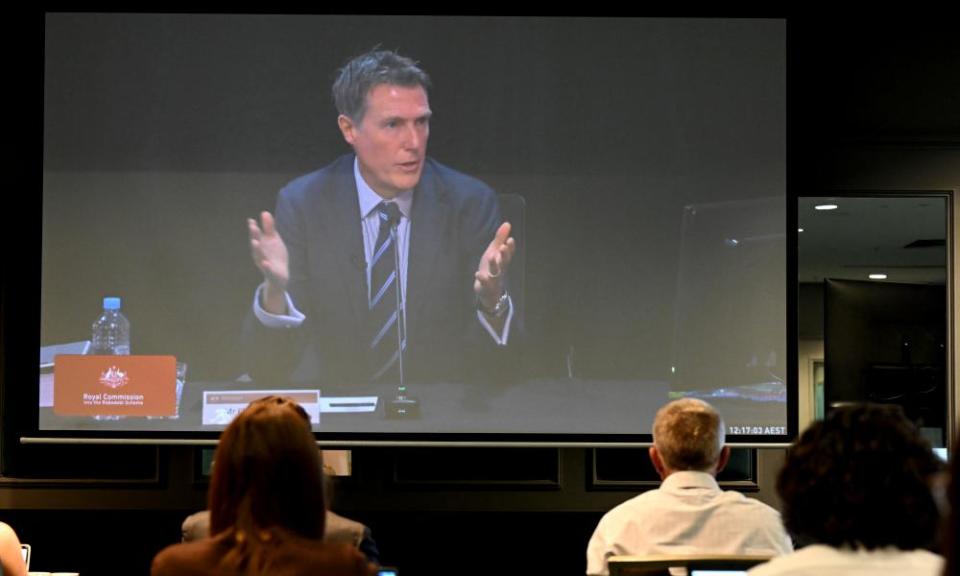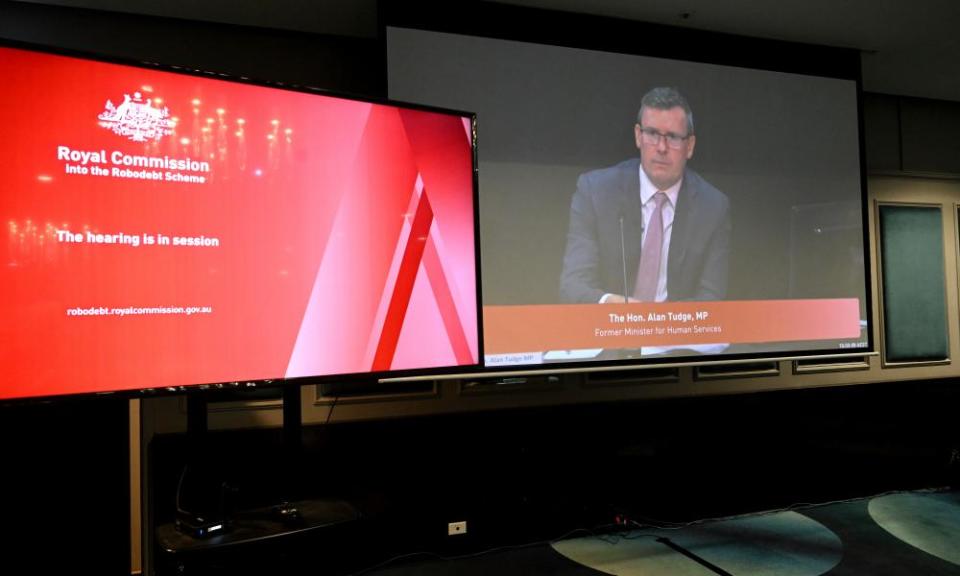Whose doing was it?: what we’ve learned from the robodebt royal commission

This week, the robodebt royal commissioner, Catherine Holmes, summed up the tenor of the evidence so far: “Everybody says it was really somebody else’s doing, and it’s a bit hard to get to the bottom of whose doing it was.”
The hearings this fortnight focused primarily on the key period in late 2016 and early 2017 when the robodebt scheme exploded into public controversy.
Here are some of the key things we learned over the past two weeks.
1. One minister digs in, another accepts some responsibility
Asked if he accepted any responsibility for the scheme, the former social services minister, Christian Porter, adopted a reflective tone: “I do. I look back on this and I see myself through the correspondence getting quite close at points to taking the next step of inquiry. I didn’t do that. I wish now that I had, but I also see the reasons that I didn’t.”
Among the reasons Porter, who has left politics, said he didn’t ask more questions about the scheme’s legality is his recollection that in early 2017 “someone” assured him it was legal. He couldn’t recall who, but said it was a public servant.
That position – and his broader claim that he didn’t turn his mind to the legality of the scheme – prompted some incredulity from Holmes.
“You don’t seem to have approached any of this from a lawyer’s point of view,” she said. “You don’t seem to have at any stage said, well, by what authority do we send the letters?”
As human services minister in early 2017, Alan Tudge was in the hot seat when the scheme faced its most controversy – that is from media, particularly Guardian Australia, and also from welfare groups and the Labor opposition.
For this reason, Tudge spent more time in the witness box than any other politician so far. Over one and half days in the stand, Tudge insisted that he had a “laser like focus” on fixing the practical problems with the scheme. This was primarily the letters sent out under the scheme.
Tudge said he was never told about the legal doubts officials in his department held about the scheme. He had no reason to believe the scheme was unlawful because it had gone through cabinet (which included legal analysis). He also suggested he didn’t have authority to stop the scheme, saying that lay with cabinet – and he was not a member.
He rejected the suggestion that if those public servants had not sought to clarify the law on robodebt (they did not), he was responsible as the minister. But, crucially, under questioning, he conceded he never suggested it be stopped either.

He faced serious questions about his handling of two suicides linked to the scheme, finding it difficult to answer why he had not sought an investigation into the second case or decided to stop the program.
2. More public service failings are revealed
Several public servants faced intense questioning.
Annette Musolino, who was chief counsel at the Department of Human Services during the scheme’s operation, faced a barrage of tough questioning. The commission heard she knew that the administrative appeals tribunal had ruled several times against the scheme. She was responsible for a team of lawyers handling these decisions, but she did not act to clarify the law.
Musolino suggested she believed the legality of the robodebt scheme had been “sorted out”. But she had seen that the department of social services had conflicting advice on the program – including a damning opinion from 2014.
Holmes said: “You had done nothing to get it sorted it out. Not even gotten advice.”
Musolino deflected blame, saying she believed the department of social services had determined the scheme was legal. Musolino will face the royal commission again later this month.
Another official who faced intense questioning was Allyson Essex, a former mid-level official at the Department of Social Services. In the middle of 2018, Essex was in possession of legal advice from a top law firm that, if acted on, would have seen the scheme stopped. The inquiry heard that Essex never acted on the advice, prompting frustration and anger from one of her subordinates, who accused her of “sitting on” the advice until she was promoted to a new role in another department five months later.
Counsel assisting the commission, Angus Scott KC, said Essex had “continually made excuses” to avoid dealing with it. She rejected that, saying she had been formulating a plan to address the issue.
3. The Coalition used shameful tactics in collusion with ‘friendly media’ to shut down controversy and attack its critics
The commission heard the extraordinary lengths to which Tudge and his office went to defend the scheme and attack those criticising it, including welfare recipients themselves.
In one case, Tudge’s office provided “de-identified” analysis of 52 individuals who’d complained about the scheme to the Australian newspaper. This was part of a broader strategy to place stories in “more friendly media”, which Miller described as “rightwing media”, naming the Australian and “the tabloids”, as well as A Current Affair and talkback stations such as 2GB. She labelled Guardian Australia, the ABC and the Sydney Morning Herald “leftwing”.
Miller said Tudge requested the details of all recipients who complained in the media. These details were sometimes used to “correct the record” where the department believed media had incorrectly reported details of robodebt cases. Miller said the effect was “there were less people speaking out in the media, which was the intention”. Holmes put this “chilling effect” to Tudge, who denied it was the intention of releasing those details.
4. The heartbreaking human cost of the scheme was laid bare
Tudge was also asked to account for his department’s handling of two suicides linked to the scheme.
The first was Rhys Cauzzo, who took his life aged 28 after reportedly being told he owed $18,000 and being contacted by an external debt collection agency.
An email shown to the commission saw Miller describing the Saturday Paper’s February 2017 story revealing Cauzzo’s suicide as “disgraceful”, with the adviser taking issue with the facts of the story. Tudge’s office later sought more details and appeared to briefly consider “correcting the record”, but Tudge was advised that pushing back would not have been a good look.
In a second case, a woman was sent a robodebt letter even though inquiries later showed there was no possibility she could have owed a debt to the government.
The commission was told that under robodebt scheme’s processes the woman may have been required to seek pay information from the same employer where she had been bullied. A loved one subsequently reported that she had taken her own life – attributing this in part to the stress of the letter.
Senior counsel assisting the inquiry, Justin Greggery KC, accused Tudge of failing to order an investigation into the case because he was sure it wouldn’t “hit the media”. Tudge rejected that.
5. Legality or not, most key players knew the system was inaccurate – and therefore unfair
Musolino told the royal commission she believed it was a “known issue” that the debts issued to welfare recipients could be inaccurate. It was “known” that using annual pay data from the tax office to suggest someone might have misreported their fortnightly income to Centrelink could lead to wrong figures. Tudge also accepted he knew this.
The implications of this are morally shameful – but they circle back to the legal issue. In crude terms, the primary reason robodebt was unfair was because the debt calculations were not based on sufficient evidence and were inaccurate. It was unfair – and it was unlawful because it was unfair.

 Yahoo Movies
Yahoo Movies 